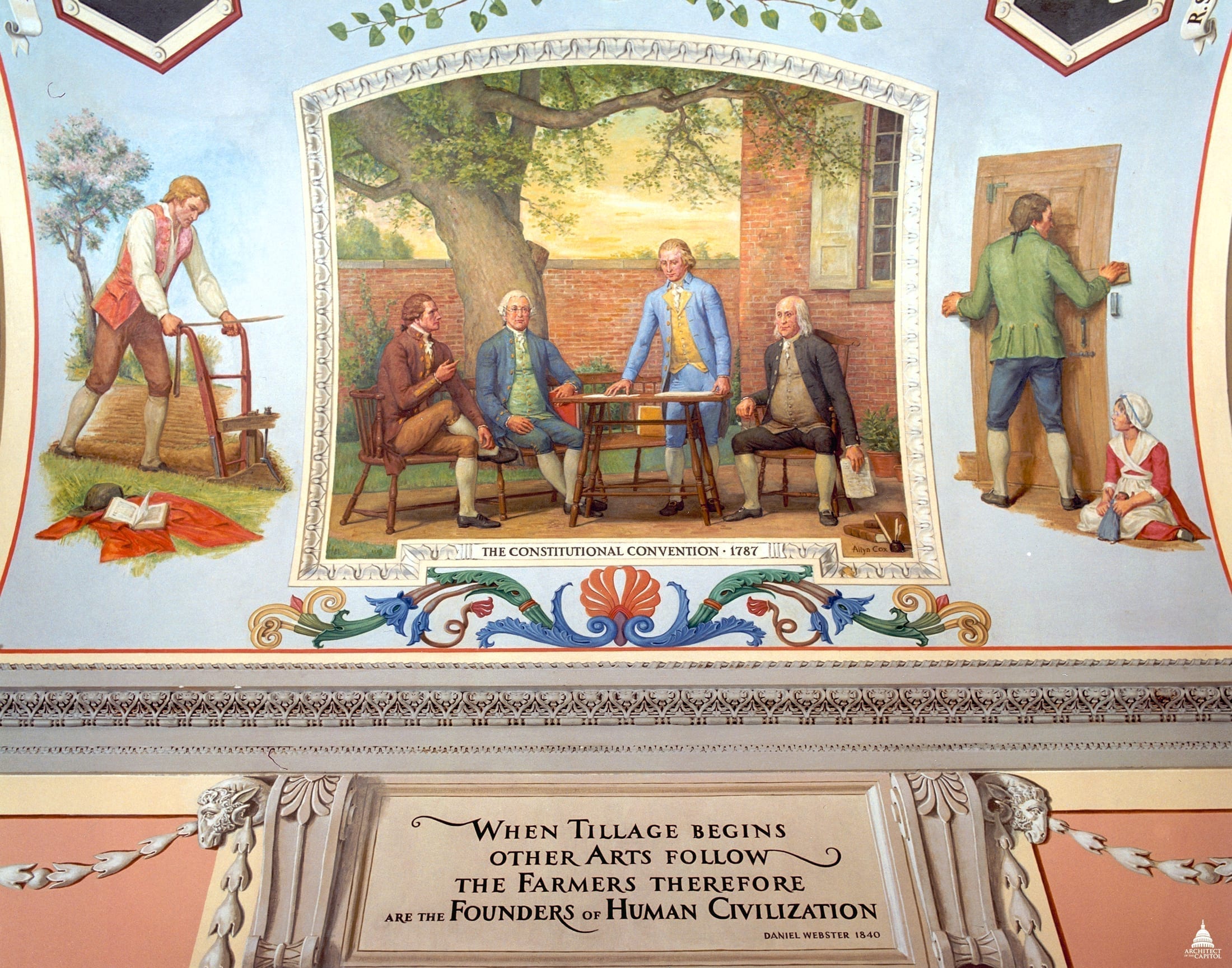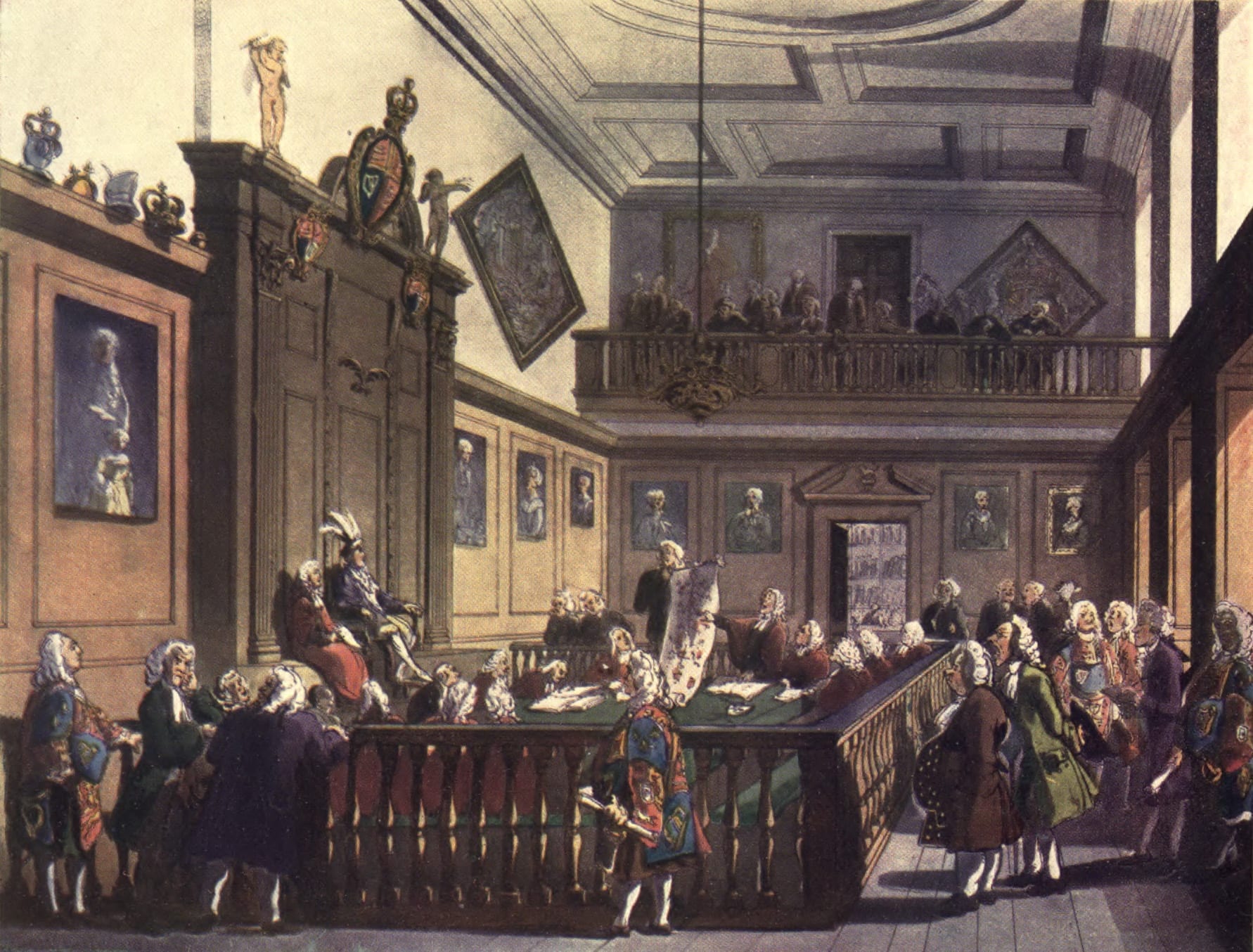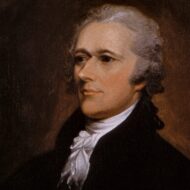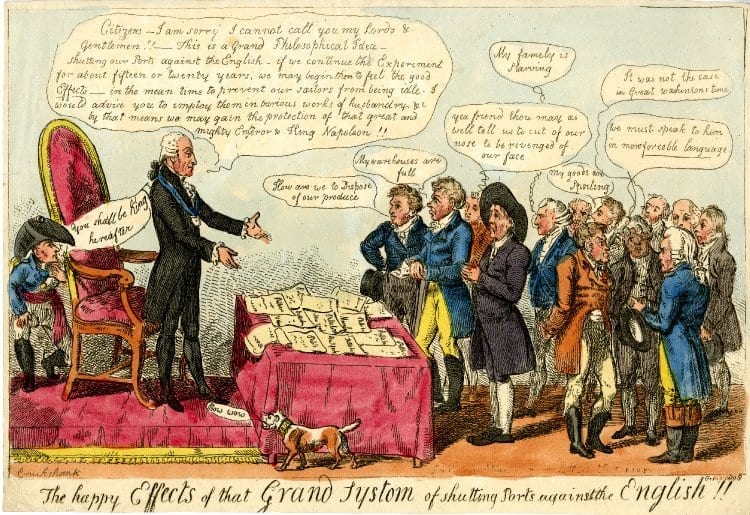

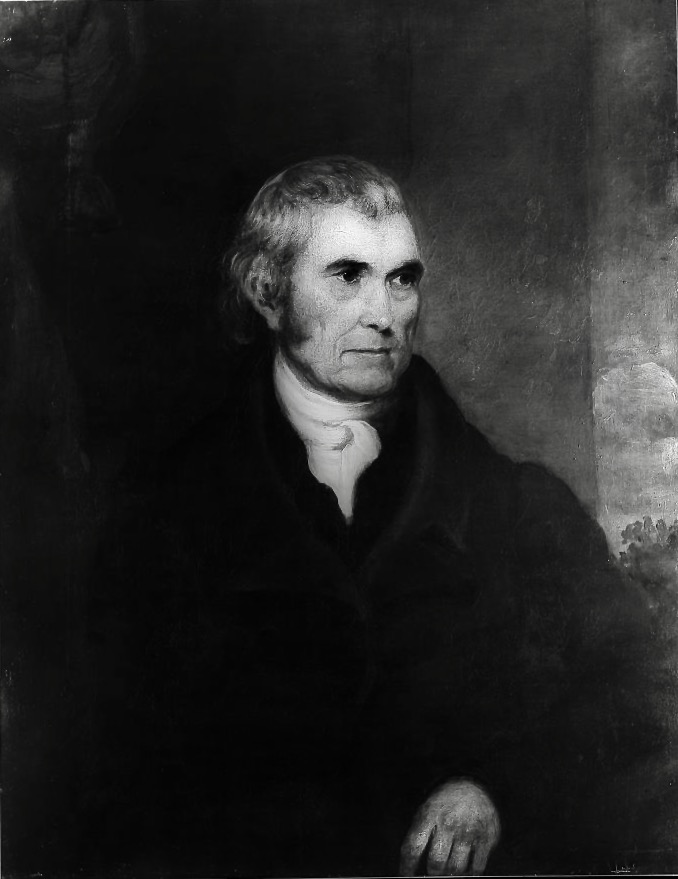
Introduction
This landmark Supreme Court case originated over a controversy regarding presidential appointments, but ultimately focused on the constitutionality of an act of Congress. Several people, including William Marbury, received last minute commissions as justices of the peace for Washington DC from the outgoing president John Adams. Unfortunately, Adams’s secretary of state John Marshall failed to deliver the signed and sealed commission to Marbury. Upon taking office, President Thomas Jefferson instructed his secretary of state, James Madison, not to deliver the commission. Marbury then appealed to the Supreme Court for a writ of mandamus to order Madison to deliver the commission. Marbury argued that the Supreme Court was given such power by Section 13 of the Judiciary Act of 1798.
In deciding the case, Chief Justice John Marshall was caught in a difficult situation. Thomas Jefferson and the Democratic-Republicans had just swept into power in the election of 1800 and many of them were eager to attack the Federalists who remained in the judicial branch, including the Supreme Court. Marshall knew that the Supreme Court was a weak institution and that under the highly contentious circumstances, the Jefferson administration would simply ignore a ruling that required Madison to deliver the commission. This would deal a further blow to the Court’s authority. At the same time, Marshall did not want the Court simply to bow to the president and thereby lose its independence.
Faced with this conundrum, Marshall confirmed in Marbury that the federal judiciary has the authority to declare a law unconstitutional and therefore void, which meant that it did not operate in the courtroom. This power of judicial review is necessary, Marshall held, to ensure the independence of the federal courts in deciding the cases that come to them according to the Constitution. But by holding that section 13 of the Judiciary Act was unconstitutional, Marshall avoided the futile attempt to order Madison to hand over Marbury’s commission. In confirming the Court’s power of judicial review, Marshall did not assert that the job of the Supreme Court is to interpret the Constitution in some broad or open-ended manner. He also did not declare that the Supreme Court’s interpretation of the Constitution is automatically binding on the other branches of the federal government. He simply said that the Court is not bound by the interpretation of the Constitution given by the other branches. Rather, it must interpret the Constitution for itself in order to decide the legal case in front of it. The duty of the Supreme Court, Marshall held, is to uphold the Constitution, which embodies the reasoned will of the American people and must therefore be authoritative over all other laws.
Source: 5 U.S. 137, https://www.law.cornell.edu/supremecourt/text/5/137
Chief Justice MARSHALL delivered the opinion of the Court, joined by Justices PATERSON, CHASE, and WASHINGTON.
At the last term, on the affidavits then read and filed with the clerk, a rule was granted in this case requiring the Secretary of State to show cause why a mandamus should not issue directing him to deliver to William Marbury his commission as a justice of the peace for the county of Washington, in the District of Columbia.
No cause has been shown, and the present motion is for a mandamus.[1] The peculiar delicacy of this case, the novelty of some of its circumstances, and the real difficulty attending the points which occur in it require a complete exposition of the principles on which the opinion to be given by the Court is founded.
These principles have been, on the side of the applicant, very ably argued at the bar. In rendering the opinion of the Court, there will be some departure in form, though not in substance, from the points stated in that argument.
In the order in which the Court has viewed this subject, the following questions have been considered and decided.
Has the applicant a right to the commission he demands?
If he has a right, and that right has been violated, do the laws of his country afford him a remedy?
If they do afford him a remedy, is it a mandamus issuing from this court?
The first object of inquiry is:
Has the applicant a right to the commission he demands?
His right originates in an act of Congress passed in February, 1801, concerning the District of Columbia.
After dividing the district into two counties, the eleventh section of this law enacts, “that there shall be appointed in and for each of the said counties such number of discreet persons to be justices of the peace as the President of the United States shall, from time to time, think expedient, to continue in office for five years.”
It appears from the affidavits that, in compliance with this law, a commission for William Marbury as a justice of peace for the County of Washington was signed by John Adams, then President of the United States, after which the seal of the United States was affixed to it, but the commission has never reached the person for whom it was made out.
In order to determine whether he is entitled to this commission, it becomes necessary to inquire whether he has been appointed to the office. For if he has been appointed, the law continues him in office for five years, and he is entitled to the possession of those evidences of office, which, being completed, became his property.
The second section of the second article of the Constitution declares, “The President shall nominate, and, by and with the advice and consent of the Senate, shall appoint ambassadors, other public ministers and consuls, and all other officers of the United States, whose appointments are not otherwise provided for.”
The third section declares, that “He shall commission all the officers of the United States.”
An act of Congress directs the Secretary of State to keep the seal of the United States, “to make out and record, and affix the said seal to all civil commissions to officers of the United States to be appointed by the President, by and with the consent of the Senate, or by the President alone; provided that the said seal shall not be affixed to any commission before the same shall have been signed by the President of the United States.”
These are the clauses of the Constitution and laws of the United States which affect this part of the case. They seem to contemplate three distinct operations:
The nomination. This is the sole act of the President, and is completely voluntary.
The appointment. This is also the act of the President, and is also a voluntary act, though it can only be performed by and with the advice and consent of the Senate.
The commission. To grant a commission to a person appointed might perhaps be deemed a duty enjoined by the Constitution. “He shall,” says that instrument, “commission all the officers of the United States.” . . .
This is an appointment made by the President, by and with the advice and consent of the Senate, and is evidenced by no act but the commission itself. In such a case, therefore, the commission and the appointment seem inseparable, it being almost impossible to show an appointment otherwise than by proving the existence of a commission; still, the commission is not necessarily the appointment; though conclusive evidence of it.
But at what stage does it amount to this conclusive evidence?
The answer to this question seems an obvious one. The appointment, being the sole act of the President, must be completely evidenced when it is shown that he has done everything to be performed by him.
Should the commission, instead of being evidence of an appointment, even be considered as constituting the appointment itself, still it would be made when the last act to be done by the President was performed, or, at furthest, when the commission was complete.
The last act to be done by the President is the signature of the commission. He has then acted on the advice and consent of the Senate to his own nomination. The time for deliberation has then passed. He has decided. His judgment, on the advice and consent of the Senate concurring with his nomination, has been made, and the officer is appointed. This appointment is evidenced by an open, unequivocal act, and, being the last act required from the person making it, necessarily excludes the idea of its being, so far as it respects the appointment, an inchoate and incomplete transaction.
Some point of time must be taken when the power of the Executive over an officer, not removable at his will, must cease. That point of time must be when the constitutional power of appointment has been exercised. And this power has been exercised when the last act required from the person possessing the power has been performed. This last act is the signature of the commission. . . .
The commission being signed, the subsequent duty of the Secretary of State is prescribed by law, and not to be guided by the will of the President. He is to affix the seal of the United States to the commission, and is to record it. . . .
It is therefore decidedly the opinion of the Court that, when a commission has been signed by the President, the appointment is made, and that the commission is complete when the seal of the United States has been affixed to it by the Secretary of State. . . .
Mr. Marbury, then, since his commission was signed by the President and sealed by the Secretary of State, was appointed, and as the law creating the office gave the officer a right to hold for five years independent of the Executive, the appointment was not revocable, but vested in the officer legal rights which are protected by the laws of his country.
To withhold the commission, therefore, is an act deemed by the Court not warranted by law, but violative of a vested legal right.
This brings us to the second inquiry, which is:
If he has a right, and that right has been violated, do the laws of his country afford him a remedy?
The very essence of civil liberty certainly consists in the right of every individual to claim the protection of the laws whenever he receives an injury. One of the first duties of government is to afford that protection. In Great Britain, the King himself is sued in the respectful form of a petition, and he never fails to comply with the judgment of his court. . . .
The Government of the United States has been emphatically termed a government of laws, and not of men. It will certainly cease to deserve this high appellation if the laws furnish no remedy for the violation of a vested legal right.
If this obloquy is to be cast on the jurisprudence of our country, it must arise from the peculiar character of the case.
It behooves us, then, to inquire whether there be in its composition any ingredient which shall exempt from legal investigation or exclude the injured party from legal redress. . . .
. . . Is the act of delivering or withholding a commission to be considered as a mere political act belonging to the Executive department alone, for the performance of which entire confidence is placed by our Constitution in the Supreme Executive, and for any misconduct respecting which the injured individual has no remedy?
That there may be such cases is not to be questioned. But that every act of duty to be performed in any of the great departments of government constitutes such a case is not to be admitted. . . .
It follows, then, that the question whether the legality of an act of the head of a department be examinable in a court of justice or not must always depend on the nature of that act.
If some acts be examinable and others not, there must be some rule of law to guide the Court in the exercise of its jurisdiction.
In some instances, there may be difficulty in applying the rule to particular cases; but there cannot, it is believed, be much difficulty in laying down the rule.
By the Constitution of the United States, the President is invested with certain important political powers, in the exercise of which he is to use his own discretion, and is accountable only to his country in his political character and to his own conscience. To aid him in the performance of these duties, he is authorized to appoint certain officers, who act by his authority and in conformity with his orders.
In such cases, their acts are his acts; and whatever opinion may be entertained of the manner in which executive discretion may be used, still there exists, and can exist, no power to control that discretion. The subjects are political. They respect the nation, not individual rights, and, being entrusted to the Executive, the decision of the Executive is conclusive. The application of this remark will be perceived by adverting to the act of Congress for establishing the Department of Foreign Affairs. This officer, as his duties were prescribed by that act, is to conform precisely to the will of the President. He is the mere organ by whom that will is communicated. The acts of such an officer, as an officer, can never be examinable by the Courts.
But when the Legislature proceeds to impose on that officer other duties; when he is directed peremptorily to perform certain acts; when the rights of individuals are dependent on the performance of those acts; he is so far the officer of the law, is amenable to the laws for his conduct, and cannot at his discretion, sport away the vested rights of others.
The conclusion from this reasoning is that, where the heads of departments are the political or confidential agents of the Executive, merely to execute the will of the President, or rather to act in cases in which the Executive possesses a constitutional or legal discretion, nothing can be more perfectly clear than that their acts are only politically examinable. But where a specific duty is assigned by law, and individual rights depend upon the performance of that duty, it seems equally clear that the individual who considers himself injured has a right to resort to the laws of his country for a remedy. . . .
The question whether a right has vested or not is, in its nature, judicial, and must be tried by the judicial authority. If, for example, Mr. Marbury had taken the oaths of a magistrate and proceeded to act as one, in consequence of which a suit had been instituted against him in which his defense had depended on his being a magistrate; the validity of his appointment must have been determined by judicial authority.
So, if he conceives that, by virtue of his appointment, he has a legal right either to the commission which has been made out for him or to a copy of that commission, it is equally a question examinable in a court, and the decision of the Court upon it must depend on the opinion entertained of his appointment.
That question has been discussed, and the opinion is that the latest point of time which can be taken as that at which the appointment was complete and evidenced was when, after the signature of the President, the seal of the United States was affixed to the commission.
It is then the opinion of the Court:
That, by signing the commission of Mr. Marbury, the President of the United States appointed him a justice of peace for the County of Washington in the District of Columbia, and that the seal of the United States, affixed thereto by the Secretary of State, is conclusive testimony of the verity of the signature, and of the completion of the appointment, and that the appointment conferred on him a legal right to the office for the space of five years.
That, having this legal title to the office, he has a consequent right to the commission, a refusal to deliver which is a plain violation of that right, for which the laws of his country afford him a remedy.
It remains to be inquired whether,
He is entitled to the remedy for which he applies. This depends on:
The nature of the writ applied for, and
The power of this court.
The nature of the writ. . . .
It is true that the mandamus now moved for is not for the performance of an act expressly enjoined by statute.
It is to deliver a commission, on which subjects the acts of Congress are silent. This difference is not considered as affecting the case. It has already been stated that the applicant has, to that commission, a vested legal right of which the Executive cannot deprive him. He has been appointed to an office from which he is not removable at the will of the Executive, and, being so appointed, he has a right to the commission which the Secretary has received from the President for his use. The act of Congress does not, indeed, order the Secretary of State to send it to him, but it is placed in his hands for the person entitled to it, and cannot be more lawfully withheld by him than by another person. . . .
This, then, is a plain case of a mandamus, either to deliver the commission or a copy of it from the record, and it only remains to be inquired:
Whether it can issue from this Court.
The act to establish the judicial courts of the United States [Judiciary Act of 1789] authorizes the Supreme Court “to issue writs of mandamus, in cases warranted by the principles and usages of law, to any courts appointed, or persons holding office, under the authority of the United States.”
The Secretary of State, being a person, holding an office under the authority of the United States, is precisely within the letter of the description, and if this Court is not authorized to issue a writ of mandamus to such an officer, it must be because the law is unconstitutional, and therefore absolutely incapable of conferring the authority and assigning the duties which its words purport to confer and assign.
The Constitution vests the whole judicial power of the United States in one Supreme Court, and such inferior courts as Congress shall, from time to time, ordain and establish. This power is expressly extended to all cases arising under the laws of the United States; and consequently, in some form, may be exercised over the present case, because the right claimed is given by a law of the United States.
In the distribution of this power, it is declared that “The Supreme Court shall have original jurisdiction in all cases affecting ambassadors, other public ministers and consuls, and those in which a state shall be a party. In all other cases, the Supreme Court shall have appellate jurisdiction.”
It has been insisted at the bar, that, as the original grant of jurisdiction to the Supreme and inferior courts is general, and the clause assigning original jurisdiction to the Supreme Court contains no negative or restrictive words, the power remains to the Legislature to assign original jurisdiction to that Court in other cases than those specified in the article which has been recited, provided those cases belong to the judicial power of the United States.
If it had been intended to leave it in the discretion of the Legislature to apportion the judicial power between the Supreme and inferior courts according to the will of that body, it would certainly have been useless to have proceeded further than to have defined the judicial power and the tribunals in which it should be vested. The subsequent part of the section is mere surplusage—is entirely without meaning—if such is to be the construction. If Congress remains at liberty to give this court appellate jurisdiction where the Constitution has declared their jurisdiction shall be original, and original jurisdiction where the Constitution has declared it shall be appellate, the distribution of jurisdiction made in the Constitution, is form without substance.
Affirmative words are often, in their operation, negative of other objects than those affirmed, and, in this case, a negative or exclusive sense must be given to them or they have no operation at all.
It cannot be presumed that any clause in the Constitution is intended to be without effect, and therefore such construction is inadmissible unless the words require it. . . .
When an instrument organizing fundamentally a judicial system divides it into one Supreme and so many inferior courts as the Legislature may ordain and establish, then enumerates its powers, and proceeds so far to distribute them as to define the jurisdiction of the Supreme Court by declaring the cases in which it shall take original jurisdiction, and that in others it shall take appellate jurisdiction, the plain import of the words seems to be that, in one class of cases, its jurisdiction is original, and not appellate; in the other, it is appellate, and not original. . . .
To enable this court then to issue a mandamus, it must be shown to be an exercise of appellate jurisdiction, or to be necessary to enable them to exercise appellate jurisdiction. . . .
It is the essential criterion of appellate jurisdiction that it revises and corrects the proceedings in a cause already instituted, and does not create that case. Although, therefore, a mandamus may be directed to courts, yet to issue such a writ to an officer for the delivery of a paper is, in effect, the same as to sustain an original action for that paper, and therefore seems not to belong to appellate, but to original jurisdiction. Neither is it necessary in such a case as this to enable the Court to exercise its appellate jurisdiction.
The authority, therefore, given to the Supreme Court by the act establishing the judicial courts of the United States to issue writs of mandamus to public officers appears not to be warranted by the Constitution, and it becomes necessary to inquire whether a jurisdiction so conferred can be exercised.
The question whether an act repugnant to the Constitution can become the law of the land is a question deeply interesting to the United States, but, happily, not of an intricacy proportioned to its interest. It seems only necessary to recognize certain principles, supposed to have been long and well established, to decide it.
That the people have an original right to establish for their future government such principles as, in their opinion, shall most conduce to their own happiness is the basis on which the whole American fabric has been erected. The exercise of this original right is a very great exertion; nor can it nor ought it to be frequently repeated. The principles, therefore, so established are deemed fundamental. And as the authority from which they proceed, is supreme, and can seldom act, they are designed to be permanent.
This original and supreme will organizes the government and assigns to different departments their respective powers. It may either stop here or establish certain limits not to be transcended by those departments.
The Government of the United States is of the latter description. The powers of the Legislature are defined and limited; and that those limits may not be mistaken or forgotten, the Constitution is written. To what purpose are powers limited, and to what purpose is that limitation committed to writing, if these limits may at any time be passed by those intended to be restrained? The distinction between a government with limited and unlimited powers is abolished if those limits do not confine the persons on whom they are imposed, and if acts prohibited and acts allowed are of equal obligation. It is a proposition too plain to be contested that the Constitution controls any legislative act repugnant to it, or that the Legislature may alter the Constitution by an ordinary act.
Between these alternatives there is no middle ground. The Constitution is either a superior, paramount law, unchangeable by ordinary means, or it is on a level with ordinary legislative acts, and, like other acts, is alterable when the legislature shall please to alter it.
If the former part of the alternative be true, then a legislative act contrary to the Constitution is not law; if the latter part be true, then written Constitutions are absurd attempts on the part of the people to limit a power in its own nature illimitable.
Certainly all those who have framed written Constitutions contemplate them as forming the fundamental and paramount law of the nation, and consequently the theory of every such government must be that an act of the Legislature repugnant to the Constitution is void.
This theory is essentially attached to a written Constitution, and is consequently to be considered by this Court as one of the fundamental principles of our society. It is not, therefore, to be lost sight of in the further consideration of this subject.
If an act of the Legislature repugnant to the Constitution is void, does it, notwithstanding its invalidity, bind the Courts and oblige them to give it effect? Or, in other words, though it be not law, does it constitute a rule as operative as if it was a law? This would be to overthrow in fact what was established in theory, and would seem, at first view, an absurdity too gross to be insisted on. It shall, however, receive a more attentive consideration.
It is emphatically the province and duty of the Judicial Department to say what the law is. Those who apply the rule to particular cases must, of necessity, expound and interpret that rule. If two laws conflict with each other, the Courts must decide on the operation of each.
So, if a law be in opposition to the Constitution, if both the law and the Constitution apply to a particular case, so that the Court must either decide that case conformably to the law, disregarding the Constitution, or conformably to the Constitution, disregarding the law, the Court must determine which of these conflicting rules governs the case. This is of the very essence of judicial duty.
If, then, the Courts are to regard the Constitution, and the Constitution is superior to any ordinary act of the Legislature, the Constitution, and not such ordinary act, must govern the case to which they both apply.
Those, then, who controvert the principle that the Constitution is to be considered in court as a paramount law are reduced to the necessity of maintaining that courts must close their eyes on the Constitution, and see only the law.
This doctrine would subvert the very foundation of all written Constitutions. It would declare that an act which, according to the principles and theory of our government, is entirely void, is yet, in practice, completely obligatory. It would declare that, if the Legislature shall do what is expressly forbidden, such act, notwithstanding the express prohibition, is in reality effectual. It would be giving to the Legislature a practical and real omnipotence with the same breath which professes to restrict their powers within narrow limits. It is prescribing limits, and declaring that those limits may be passed at pleasure.
That it thus reduces to nothing what we have deemed the greatest improvement on political institutions—a written Constitution, would of itself be sufficient, in America where written Constitutions have been viewed with so much reverence, for rejecting the construction. But the peculiar expressions of the Constitution of the United States furnish additional arguments in favor of its rejection.
The judicial power of the United States is extended to all cases arising under the Constitution.
Could it be the intention of those who gave this power to say that, in using it, the Constitution should not be looked into? That a case arising under the Constitution should be decided without examining the instrument under which it arises?
This is too extravagant to be maintained. . . .
Why otherwise does it direct the judges to take an oath to support it? This oath certainly applies in an especial manner to their conduct in their official character. How immoral to impose it on them if they were to be used as the instruments, and the knowing instruments, for violating what they swear to support! . . .
Why does a judge swear to discharge his duties agreeably to the Constitution of the United States if that Constitution forms no rule for his government? if it is closed upon him and cannot be inspected by him?
If such be the real state of things, this is worse than solemn mockery. To prescribe or to take this oath becomes equally a crime.
It is also not entirely unworthy of observation that, in declaring what shall be the supreme law of the land, the Constitution itself is first mentioned, and not the laws of the United States generally, but those only which shall be made in pursuance of the Constitution, have that rank.
Thus, the particular phraseology of the Constitution of the United States confirms and strengthens the principle, supposed to be essential to all written Constitutions, that a law repugnant to the Constitution is void, and that courts, as well as other departments, are bound by that instrument.
The rule must be discharged.
- 1. An order to an inferior court or a person to perform a public or statutory duty.
Purchase of Louisiana
July 05, 1803
Conversation-based seminars for collegial PD, one-day and multi-day seminars, graduate credit seminars (MA degree), online and in-person.






